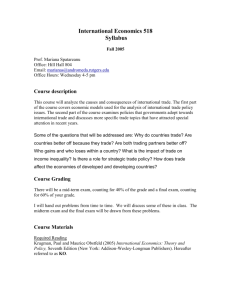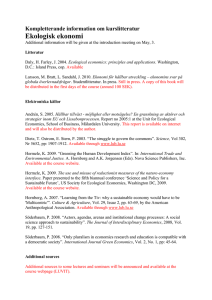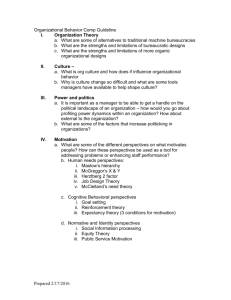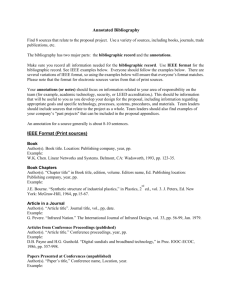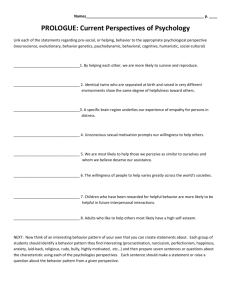Indiana University-Purdue University Indianapolis Department of
advertisement
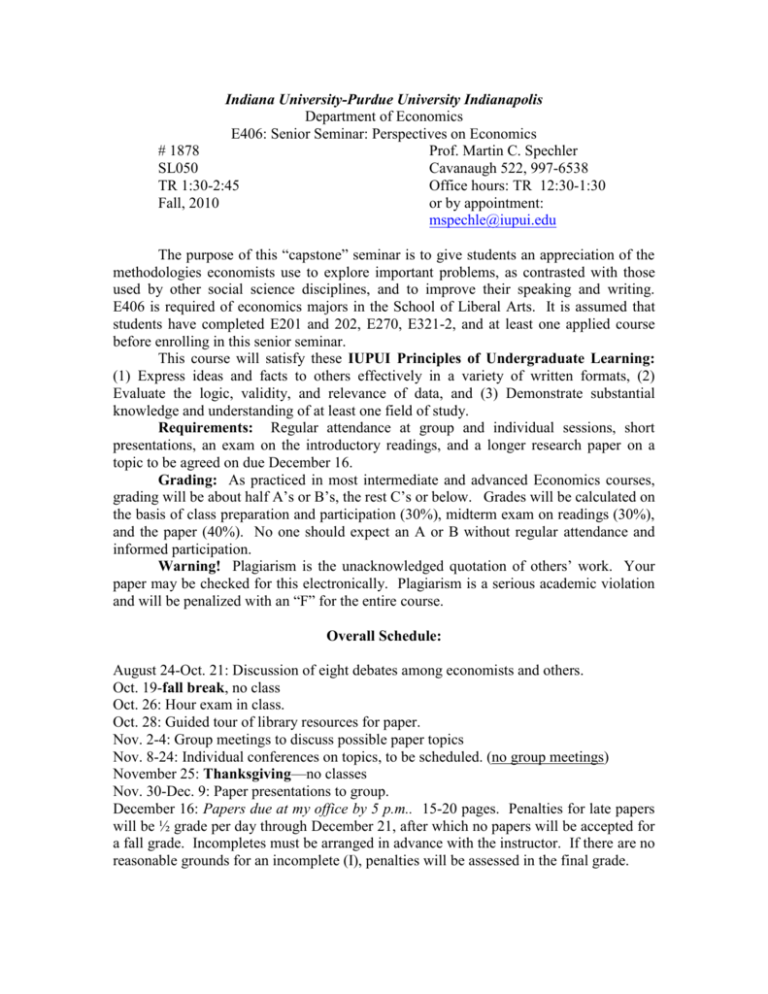
Indiana University-Purdue University Indianapolis Department of Economics E406: Senior Seminar: Perspectives on Economics # 1878 Prof. Martin C. Spechler SL050 Cavanaugh 522, 997-6538 TR 1:30-2:45 Office hours: TR 12:30-1:30 Fall, 2010 or by appointment: mspechle@iupui.edu The purpose of this “capstone” seminar is to give students an appreciation of the methodologies economists use to explore important problems, as contrasted with those used by other social science disciplines, and to improve their speaking and writing. E406 is required of economics majors in the School of Liberal Arts. It is assumed that students have completed E201 and 202, E270, E321-2, and at least one applied course before enrolling in this senior seminar. This course will satisfy these IUPUI Principles of Undergraduate Learning: (1) Express ideas and facts to others effectively in a variety of written formats, (2) Evaluate the logic, validity, and relevance of data, and (3) Demonstrate substantial knowledge and understanding of at least one field of study. Requirements: Regular attendance at group and individual sessions, short presentations, an exam on the introductory readings, and a longer research paper on a topic to be agreed on due December 16. Grading: As practiced in most intermediate and advanced Economics courses, grading will be about half A’s or B’s, the rest C’s or below. Grades will be calculated on the basis of class preparation and participation (30%), midterm exam on readings (30%), and the paper (40%). No one should expect an A or B without regular attendance and informed participation. Warning! Plagiarism is the unacknowledged quotation of others’ work. Your paper may be checked for this electronically. Plagiarism is a serious academic violation and will be penalized with an “F” for the entire course. Overall Schedule: August 24-Oct. 21: Discussion of eight debates among economists and others. Oct. 19-fall break, no class Oct. 26: Hour exam in class. Oct. 28: Guided tour of library resources for paper. Nov. 2-4: Group meetings to discuss possible paper topics Nov. 8-24: Individual conferences on topics, to be scheduled. (no group meetings) November 25: Thanksgiving—no classes Nov. 30-Dec. 9: Paper presentations to group. December 16: Papers due at my office by 5 p.m.. 15-20 pages. Penalties for late papers will be ½ grade per day through December 21, after which no papers will be accepted for a fall grade. Incompletes must be arranged in advance with the instructor. If there are no reasonable grounds for an incomplete (I), penalties will be assessed in the final grade. ASSIGNMENTS Week 0: Jared Diamond, Guns, Germs, and Steel. (Norton pb, 1981, available in Student Bookstore), pp. 15-25, 354-401, 405-25 (at least). Differences between geographical and economic history approach to the rise of Western market economies. (Thursday: discussion of pp. 405-25 only) Week 1 (Aug. 31): Financial Markets. Burton Malkiel, “The Efficient Market Hypothesis and Its Critics,” and Robert J. Shiller, “From Efficient Markets Theory to Behavioral Finance,” in Journal of Economic Perspectives, vol. 17, no. 1 (Winter, 2003, pp. 59-104). [Oncourse] (Student discussant: Radoulev) Week 2 (Sept. 7). Africa—Tuesday, discussion of Diamond, pp. 376-401. Reading: Paul Collier and Jan Willem Gunning, “Why Has Africa Grown Slowly?” Journal of Economic Perspectives, vol. 13, no. 3 (Summer, 1999), pp. 3ff. [Oncourse] (Discussants: Ogundele, Chinyoka). Guest lecture on Thursday. . Week 3. (Sept. 14)Monetary transmission. Articles by Frederic Mishkin, John B. Taylor, Ben Bernanke and Mark Gertler, and Alan Meltzer, Journal of Economic Perspectives, vol. 9, no. 4 (Fall, 1995), pp. 3-72. [Oncourse] (Student discussant: Niyyar) Week 4. (Sept. 21)Globalization and trade. Articles by Dani Rodrik and M. Obstfeld in The Journal of Economic Perspectives, vol. 12 no. 4 (Winter, 1998), pp. 3-. [Oncourse] Journal of Economic Perspectives, Winter, 2002, by Richard Cooper, “Global Imbalances: Globalization, Demography, and Sustainability,” Journal of Economic Perspectives, vol. 2008, no. 3 (Student discussant: O’Connor) Week 5. (Sept. 28) Fiscal policy. Articles by John Taylor, “Reassessing Discretionary Fiscal Policy,” Journal of Economic Perspectives, vol. 14, no. 3 (Summer 2000), pp. 2136, and by Gregory Mankiw, vol. 20, no. 4 (2006), pp. 29-46. [Oncourse], (Student discussant: Conner) Week 6. (Oct. 5) Sports economics. Tuesday: Guest lecture by Robert Sandy. Readings: Lawrence M. Kahn, “The Sports Business as a Labor Market Laboratory,” and John Siegfried and Andrew Zimbalist, “The Economics of Sports Facilities and Their Communities,” The Journal of Economic Perspectives, vol. 14, no.3 (Summer, 2000), pp. 75-114. [Oncourse] (Student discussant: Atkin) . Week 7: (Oct. 12) Social Security. Peter Diamond and Peter Orszag, “Saving Social Security,” Journal of Economic Perspectives, vol. 19, (Spring, 2002), pp. 11-32; and Medicare: David Cutler, “Walking the Tightrope in Medicare Reform,” and Victor Fuchs, “Medicare Reform: The Larger Picture,” in Journal of Economic Perspectives, vol.14, no. 2 (Spring, 2000), pp. 45-70. [Oncourse] (Student discussants: Shultz, Ahmed) Week 8. Fall break: no class Tuesday, Oct. 19. Thursday, Oct. 21, Discussion: Family economics. Articles by Marianne Bertrand and Antoinette Schoar, “The Role of Family 2 in Family Firms,” Journal of Economic Perspectives, vol. 20, no 2 (Winter, 2005), pp. 73-96; and Shelly Lundberg and Robert Pollak, “The American Family and Family Economics,” Journal of Economic Perspectives, vol. 21, no. 2 (spring, 2007), pp. 3-26. (Student discussants: Taylor, McDermed ) Week 9. Hour exam Tuesday, Oct. 26, in class. Thursday: trip to Library. Week 10: (Nov. 2 and 4) Discussion of possible paper topics in class. Weeks 11-13. (Nov. 8-24) Individual conferences on outlines, as scheduled. No group classes. Week 14-15. (Nov. 30-Dec. 9) Individual presentations to class, 10-15 minutes each.. December 16—papers due by 5 p.m. 3
